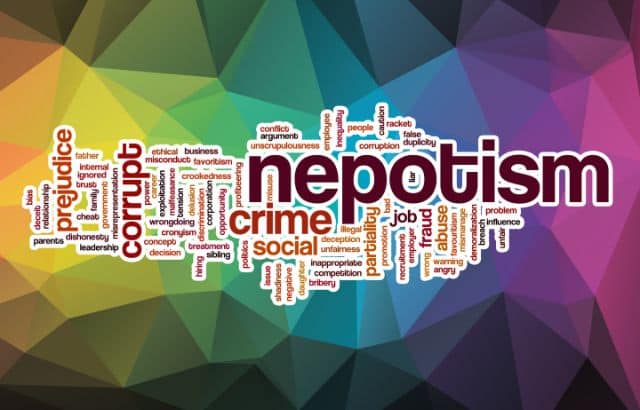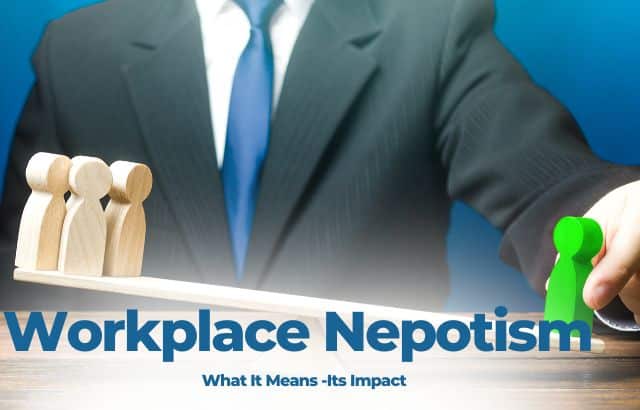Workplace Nepotism often stirs debate in professional settings. It involves favoring relatives or close friends in hiring and promotions. While it can offer benefits, nepotism is frequently criticized for undermining fairness and meritocracy. Understanding its implications helps organizations navigate its complexities and address issues effectively.
Table of Contents
The Keys to Hiring Smart When Running a Daily Business

Strategic Talent Acquisition: Running a successful daily business requires strategic talent acquisition. Identifying,hiring individuals with the right skills, mindset, and cultural fit is key to maintaining a productive and harmonious work environment.
Cultivating a High-Performance Culture: The keys to hiring smart extend beyond technical qualifications to fostering a culture of high performance. Leaders like Hirav Shah emphasize the importance of building a team that aligns with the company’s vision, values, and goals.
What is Nepotism in the Workplace?

Definition: Nepotism in the workplace refers to the practice of favoring relatives or close friends when making employment decisions. This can include hiring, promoting, or providing other professional advantages based on personal relationships rather than merit.
Is Nepotism in the workplace Unethical?

The answer isn’t a black-and-white issue. On the one hand, nepotism can stifle talent development, breed resentment among employees, and damage company culture. Imagine the frustration of watching less qualified climb the ladder simply because they share a last name with the CEO!
Consequently, the ethical implications of workplace nepotism come into question. It may compromise fairness and equal opportunities, thereby undermining the merit-based principles that should ideally govern professional environments.
Negative Consequences of Hiring Family Members

Resentment Among Employees: Nepotism can foster resentment among non-family staff, who may perceive promotions and opportunities as unfairly restricted. This can lead to feelings of injustice and lower motivation.
Impact on Team Dynamics: Adding family members to the team can disrupt group dynamics, causing conflicts or perceptions of favoritism, which can hurt overall workplace morale.
Reduced Objectivity: Personal relationships influencing professional decisions can compromise objectivity, potentially undermining the quality of strategic business choices.
Positive Benefits of Hiring Family Members

Enhanced Trust and Loyalty: Family members often bring a deep sense of trust and loyalty to the workplace, which can strengthen camaraderie and commitment among the team.
Streamlined Communication: The familiarity between family members can lead to more effective communication, enhancing collaboration and teamwork.
Shared Vision and Values: Family members may share similar goals and values, fostering a unified organizational culture and driving a cohesive work environment.
How to Hire a Family Member

Transparent Processes: Establish transparent hiring processes that emphasize fairness, meritocracy, and equal opportunities for all candidates, regardless of their familial connections.
Clear Communication: Clearly communicate expectations and standards to family members during the hiring process to ensure they understand the importance of maintaining professionalism and avoiding conflicts of interest.
Performance Evaluation: Implement fair and objective performance evaluation mechanisms to assess the contributions of family members, ensuring that promotions and advancements are based on merit.
Here are some examples and case studies to illustrate the complexities of nepotism in the workplace:
Case Study 1: Family-Owned Business
Company: Smith & Sons Manufacturing
Scenario: Smith & Sons is a third-generation family-owned manufacturing company. The founder’s son, John, has been working in the company since graduating college. Despite lacking formal management training, John is promoted to a senior management position.
Positive Aspects:
- Trust and Continuity: John has a deep understanding of the company’s history, values, and operations. His promotion ensures continuity in leadership and maintains family control, which is crucial for the company’s identity and stability.
- Motivation: John’s commitment to the company is strong due to his family ties, leading him to work long hours and stay highly engaged.
Negative Aspects:
- Lack of Experience: John’s lack of formal management training leads to several strategic errors, which affect the company’s performance and profitability.
- Employee Morale: Other employees feel frustrated and demotivated, as they believe more qualified and experienced colleagues were overlooked for the promotion.
Complexity: This case illustrates how nepotism can be a double-edged sword. While family loyalty and continuity are preserved, lack of merit-based promotions can impact overall company performance and employee satisfaction.
Case Study 2: Tech Startup
Company: Innovatech Solutions
Scenario: Innovatech Solutions is a rapidly growing tech startup. The founder’s daughter, Emily, is hired as a lead developer, despite her limited experience compared to other candidates.
Positive Aspects:
- Cultural Fit: Emily’s understanding of the company’s culture and her innovative ideas contribute positively to the product development process.
- Networking and Opportunities: Being a family member of the founder, Emily has access to a broader network of potential clients and partners, which can be beneficial for the company.
Negative Aspects:
- Perceived Inequality: Other employees feel that Emily’s hiring was preferential and not based on merit. This leads to tension and diminished morale among staff who are more experienced.
- Risk of Conflict: If Emily faces difficulties or fails to deliver, her performance issues might be attributed to nepotism rather than individual capability, complicating performance management.
Complexity: This example highlights how nepotism can influence both positive aspects like cultural alignment and networking benefits, but also introduce risks related to perceived fairness and the impact on team dynamics.
Case Study 3: Multinational Corporation
Company: GlobalCorp Inc.
Scenario: In GlobalCorp, a major multinational corporation, the CEO’s cousin is hired as a regional director. Although the cousin has impressive credentials, their rapid rise through the ranks raises questions.
Positive Aspects:
- Expertise: The cousin brings valuable experience and a fresh perspective to the regional office, leading to improved strategic initiatives and business growth in the region.
- Strong Performance: The cousin performs exceptionally well, surpassing expectations and contributing to significant business gains.
Negative Aspects:
- Increased Scrutiny: Despite the cousin’s success, the perception of nepotism remains, leading to skepticism from other employees about the fairness of promotion practices.
- Potential for Bias: Other employees might feel that promotions or opportunities are influenced by relationships rather than merit, leading to decreased trust in leadership and reduced overall morale.
Complexity: This case underscores how even when a family member performs well, the perception of nepotism can overshadow achievements and affect overall organizational trust and morale.
Case Study 4: Nonprofit Organization
Company: Community Care Foundation
Scenario: In this nonprofit, the founder’s nephew is appointed as the head of fundraising. The nephew has connections and fundraising experience but is relatively new to the nonprofit sector.
Positive Aspects:
- Fundraising Success: The nephew leverages his connections to secure large donations and grants, significantly boosting the organization’s funding.
- Innovative Strategies: He introduces new and effective fundraising strategies that positively impact the organization’s mission.
Negative Aspects:
- Staff Discontent: Long-standing staff members feel that the appointment was based more on family connections than on relevant sector experience, leading to dissatisfaction.
- Challenges in Performance Evaluation: The focus on family relationships complicates performance evaluations and accountability, as employees might question whether success is attributed to personal relationships rather than actual effectiveness.
Complexity: This scenario demonstrates how nepotism can sometimes lead to substantial achievements but also create challenges related to staff morale and perception of fairness.
Each case shows how nepotism can be both advantageous and problematic, depending on factors like the performance of the family member involved, the existing company culture, and the overall impact on the organization.
Case Studies for Consideration:
Netflix and the Sandberg Saga: Explore the controversy surrounding Sheryl Sandberg’s brother-in-law Robert Kotick, CEO of Activision Blizzard, being appointed to Netflix’s board. Analyze the potential conflicts of interest and ethical implications of such a close familial connection.
Family-Owned Businesses: Look at successful family-run businesses like Samsung or Tata Group and examine their strategies for balancing family influence with professional competence. Analyze their governance structures and succession plans to understand how they mitigate nepotism risks.
Startups and Founder Families: Investigate the challenges faced by young companies where founders bring in family members for key roles. Consider the pressure on family members, potential resentment among employees, and how such startups navigate these dynamics.
Frequently asked question on Workplace Nepotism

What is nepotism in the workplace?
Answer: Nepotism in the workplace is the practice of favoring relatives or close friends in hiring, promotions, or other employment decisions.
How does nepotism affect employee morale?
Answer: Nepotism can negatively impact employee morale by creating perceptions of unfairness, reducing motivation, and fostering resentment among non-favored employees.
What are the legal implications of workplace nepotism?
Answer: While nepotism itself is not illegal, it can lead to legal issues if it results in discriminatory practices or violates company policies and labor laws.
How can companies prevent nepotism?
Answer: Companies can prevent nepotism by implementing clear hiring and promotion policies, ensuring transparency in decision-making, and promoting a merit-based culture.
Can nepotism ever be beneficial in a workplace?
Answer: Nepotism can sometimes be beneficial if it leads to a trusted and loyal workforce, but it generally carries risks of bias and unfairness that outweigh potential advantages.
Conclusion:
In the workplace, navigating the delicate balance between professional decisions and personal relationships is crucial for maintaining a healthy organizational culture. As inspired by the principles of strategic business leadership advocated by Hirav Shah, addressing workplace nepotism requires a commitment to fairness, transparency, and the cultivation of a high-performance culture. By hiring smart, emphasizing merit-based practices, and promoting equal opportunities, organizations can create an environment that fosters success while upholding ethical standards in the hiring process.










